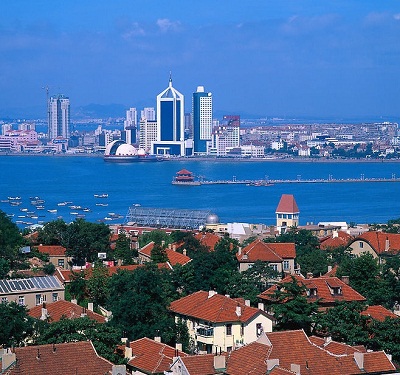Qingdao Hotel Picks
Qingdao is a city steeped in China's 20th century history. It was taken as part of the Imperial German Concession of Jiaozhou Bay. Despite ongoing discussions with Chinese authorities about giving the Germans a territory, on 7 November 1897, they landed troops. Their pretext was the murder of two missionaries on 1 November of that year.
 The concession treaty was signed on 6 March 1899, for a 99-year lease. The Germans acquired it as a relatively unimportant town of about 1,000 inhabitants. Yet by 1902, it had grown to 668 Caucasians and 15,000 Chinese.
The concession treaty was signed on 6 March 1899, for a 99-year lease. The Germans acquired it as a relatively unimportant town of about 1,000 inhabitants. Yet by 1902, it had grown to 668 Caucasians and 15,000 Chinese.
During the colonial period, the Germans left a distinct mark on Qingdao's architecture that can still be seen in its historic center and train station. The train station has undergone a recent overhaul that has tried to strike a balance between maintaining its colonial heritage while modernizing to be the terminus of the high speed rail line to Beijing. Many German-period buildings have been preserved as heritage monuments. It is a kind of Bavaria-on-the-East-China-Sea, where they even sell Bratwurst on the street. In 1903, China's most well-known beer maker, Tsingtao brewery, was established by the new occupants homesick for Germany.
Japan occupied Qingdao on 27 August, 1914, as part of World War I, and remained until 1922. They took the city because they were allied with the British against the Germans during World War I. After the war, the Japanese wanted to continue to hold the city for the remainder of the German lease, and the Chinese government was going to accede. However, protests by students in Beijing during the May 4th Movement of 1919, eventually forced them to return the city to Chinese sovereignty. In 1937, the Japanese again took Qingdao and remained until the end of World War II in 1945. Between 1945 and 1949 the American 7th Fleet was based in Qingdao as it assisted the Kuomintang in fighting the Communist Party; the Communists took the city in 1949.
While Qingdao has a long history, the eastern half of the city has been built since 1993, and there is no sign of it slowing down. In 2008, it hosted the sailing events of the 2008 Summer Olympics in Beijing.
Qingdao's early summer is quite an enjoyable season, although it can be humid near the sea shore. Late summer can become hot, while other places of Northern China start to feel cooler. The climate in late fall and winter can be harsh but snow patches can generally last no longer than a few days. Qingdao is an ideal destination if you want to combine sea-side fun with your trip to China.
If you are looking for the typical congested Chinese scenario with swarming markets, unpredictable traffic and intense street commerce, Qingdao has little to offer. For instance, bicycling is actually forbidden. The city is relatively clean and orderly and might give the impression of an upcoming wanna-be Singapore.
from http://wikitravel.org